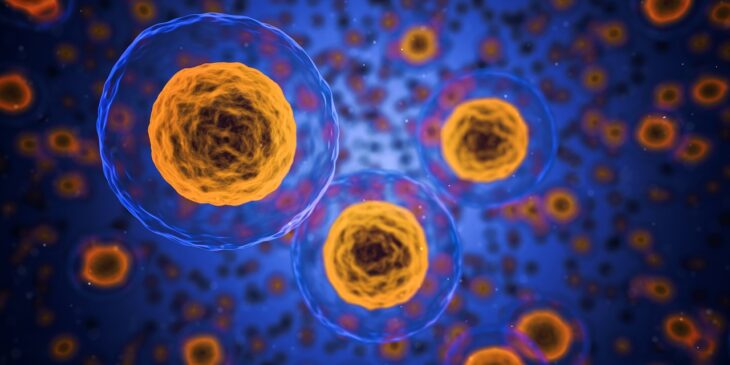Cancer results from abnormal, uncontrolled cell growth that forms dense clumps, called solid tumors. Cancer cells display special surface markers, known as antigens, which can be recognized by our immune cells. A key part of our immune system is T-cells, which carry a defense protein called FasL that helps kill cancer cells. When T-cells encounter cancer antigens, they become activated and launch an attack on the tumor.
One type of immunotherapy, called Chimeric Antigen Receptor T-cell therapy or CAR-T therapy, uses a patient’s own T-cells that are reprogrammed in the lab to recognize cancer cell antigens. However, CAR-T therapy often works poorly against solid tumors. This is because the dense and hostile interior of a solid tumor prevents immune cells from entering it and working effectively.
Another major challenge doctors face in treating solid tumors is that they are made up of many different kinds of cancer cells. Some have the antigen that CAR-T cells can recognize, but others don’t. This makes it difficult for scientists to design CAR-T therapy that targets all the tumor cells without harming healthy cells. Solid tumors also make a protein called plasmin, which breaks down FasL and further weakens the immune system’s ability to kill cancer cells.
A team of researchers at the University of California, Davis, tested whether protecting FasL from plasmin would preserve its cancer-killing ability and make CAR-T therapy more effective. The team found that the human FasL protein has one amino acid that is different from other primates. This small change makes it easier for plasmin to cut. They observed that once FasL was cut, it lost its ability to kill tumor cells. When they injected antibodies that blocked plasmin from cutting FasL, it remained intact and kept its ability to kill cancer.
Studying cell behavior directly in the human body is difficult, so scientists grow tumor cells, called cell lines, in petri dishes under controlled lab conditions. To better understand how plasmin works, the team examined ovarian cancer cell lines taken from patients. They found that the cancer cells resistant to CAR-T treatment had high plasmin activity.
When they mixed normal cells that had FasL on their surface with ovarian cancer cells that had high plasmin, they found that the amount of FasL on the normal cells decreased. When the team added the FasL-protecting antibody, CAR-T cells killed the cancer cells they were designed to target, as well as nearby cancer cells that lacked the target antigen. The researchers interpreted these observations to mean that plasmin can cut FasL on T-cells and weaken CAR-T therapy. This suggested that protecting FasL can also make CAR-T treatment more effective.
To see if tumor-produced plasmin can disable human FasL under more natural conditions, the researchers tested its function inside living tumors with an active immune system. They implanted ovarian, mammary, and colorectal tumor cell lines from mice into genetically matched mice so the immune system would respond naturally. When they injected human FasL protein directly into the mice’s tumors, the cancer cells remained intact. However, when they injected a drug that blocks plasmin, the cancer cells died. When they injected a FasL-protecting antibody, the cancer cells similarly died.
As a final step, the team wanted to determine if activated T-cells from a mouse’s immune system could enter tumors and kill cancer cells. To test this, they implanted plasmin-positive and plasmin-negative tumors into mice. They treated both tumors with a drug that boosts immune cell activity and increases FasL production.
They found that in tumors with low plasmin, the mice’s immune cells had high levels of FasL on their surfaces, but in tumors with high plasmin, FasL levels were much lower. When they injected the FasL-protecting antibody into these tumors, the FasL levels increased again. The researchers concluded that plasmin can weaken the body’s ability to kill cancer cells by removing FasL from immune cells.
Overall, the team found that tumors use plasmin to break down the defense protein FasL and evade attack by the immune system. Based on these results, they suggested that plasmin-blocking drugs or FasL-protecting antibodies could improve how effectively immunotherapy treats cancer.


